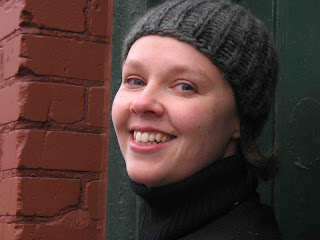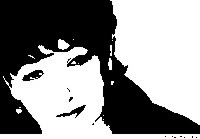 Marita Dachsel's first full-length book of poetry, All Things Said & Done, was published this spring by Caitlin Press. She was born and raised in Williams Lake, BC, and has lived in Kamloops, Dawson City,Vancouver, Auckland and Montpellier, France. She has an MFA in creative writing from UBC and has been published widely in Canadian literary journals. She had been a contributor to the online magazines sweetspot.ca and sweetmama.ca and has written for The Globe and Mail. She's dabbled in playwriting and screenwriting, but finds herself most at home with fiction and poetry. She currently lives in Edmonton with her husband, Kevin Kerr, and their son, Atticus.
Marita Dachsel's first full-length book of poetry, All Things Said & Done, was published this spring by Caitlin Press. She was born and raised in Williams Lake, BC, and has lived in Kamloops, Dawson City,Vancouver, Auckland and Montpellier, France. She has an MFA in creative writing from UBC and has been published widely in Canadian literary journals. She had been a contributor to the online magazines sweetspot.ca and sweetmama.ca and has written for The Globe and Mail. She's dabbled in playwriting and screenwriting, but finds herself most at home with fiction and poetry. She currently lives in Edmonton with her husband, Kevin Kerr, and their son, Atticus.1 - How did your first book change your life?
Not very much, but I think that's a good thing. My life is pretty much the same as it had been. I think it would be very difficult for both the writing and the ego if one's first book greatly changed your life. But it did give me an external, tangible validation that publishing in journals just doesn't match. My parents can show their friends my book and everyone can understand what it is I do. It's nice to be able to give your family something to brag about. Probably the best life-changing perk was that it allowed me to go on tour through northern BC with the lovely and talented PG poet Gillian Wigmore. At that point she had been a friend of a friend and now I count her amongst my cherished friends. That was a treat.
2 - How long have you lived in Edmonton, and how does geography, if at all, impact on your writing? Does race or gender make any impact on your work?
As of Thursday, I will have been here four weeks. Our family moved because my husband, Kevin Kerr, has been made U of A's Lee Playwright in Residence. Other than some relatively brief stints in France, New Zealand and the Yukon, I'm a BC girl. It might take our full two years here before I can consider myself an Edmontonian. Geography definitely impacts my writing. Many of my poems in All Things Said & Done were inspired by places I'd traveled to or lived in, but I can't seem to write about where I currently am. Perhaps this will mean now that I'm in Edmonton I'll finally be able to write about Vancouver, after living there for twelve years. Does race and gender impact my work? I think so, but not as overtly as geography had. I think everything about life, one's life's experiences, impacts what we write.
3 - Where does a poem usually begin for you? Are you an author of short pieces that end up combining into a larger project, or are you working on a "book" from the very beginning?
It depends on the poem. Sometimes it's an image or a phrase. Sometimes the poems arrives whole, other times it's a long building process. All Things Said & Done was mostly a collection of short pieces combined into a larger project, with one section envisioned as a 'series' and then added to the collection. However, the collection I'm currently working on has been a 'book' from the very beginning. On one hand, it's a lot less daunting. I know what I need to write to fill the pages. But on the other hand, it's a little scary: will I be able to write the poems I need to write? I find it a lot more challenging, which I think is good for me as a writer.
4 - Are public readings part of or counter to your creative process?
If you had asked me this before my book came out, I would have said 'neither.' I did almost no readings the entire time I wrote my first book. I didn't even like to read the poems aloud to myself. But since being forced to do readings to promote the book, it has changed how I view them. Before, the idea of reading my own work made me twitchy, but since the tour I realised how important readings are. Not just with connecting to the readers, but with learning about my own writing, understanding the rhythms of my own work.
5 - Do you have any theoretical concerns behind your writing? What kinds of questions are you trying to answer with your work? What do you even think the current questions are?
Maybe? I don't have a list that I'm aware of, but I know that as I write, I do work through things, on emotional and intellectual levels. I am going to keep those to myself, however.
6 - Do you find the process of working with an outside editor difficult or essential (or both)?
I'm part of a small writing group (poets Jennica Harper and Laisha Rosnau) and we've been reading each other's work for almost six years now. I consider them my first editors and I love getting their feedback. I'm at the point where if they haven't read it yet, the poem won't feel ready. I was fortunate to have Silas White as the editor of my first collection. He was fantastic and I'd love to work with him again. He's got such a great ear and eye for poetry, but also respects the wishes and impulses of the writer. For me, to date, it's been essential, but only because I've been lucky enough to work with some great people. I'm sure my opinion would change if I had a bad experience.
7 - When was the last time you ate a pear?
Today! Shared one with my son. We're getting organics delivered once a week and it's all about BC fruit and local vegies right now. Yum.
8 - What is the best piece of advice you've heard (not necessarily given to you directly)?
"Never trust a man with thin lips." Okay, that might not be the best advice I've ever heard, but the only thing I can remember right now.
9 - What kind of writing routine do you tend to keep, or do you even have one? How does a typical day (for you) begin?
Writing? Routine? I have an 18 month old son and another babe to be born in February. I haven't, nor will have, a writing routine for some time. Sometimes I try to write during naps or after dinner, but nothing resembling a routine yet. Once upon a time, when I had the time and means to write regularly (thank you, Canada Council!), I would get up, have breakfast, make a pot of tea, and write all morning. Then go to a yoga class or for awalk. If I still felt up for writing after that, I'd return to it, but otherwise I'd do things like reading, research, or returning correspondence. It was a lovely time.
10 - When your writing gets stalled, where do you turn or return for (for lack of a better word) inspiration?
I don't have a prescribed place, inspiration could come from anywhere. Lately, I've been writing from my obsessions, so if stuck I just return to my research. But I've been inspired by visual art, theatre, dance, music, nature, archetecture, friends, strangers, so many things. I think you just have to be open to it.
11 - How does your most recent book compare to your previous work? How does it feel different?
My recent book is my previous work. It's a collection of what I hope are the best poems I've written since I began to take writing seriously. The oldest one in the collection was written in 1994 (!) and the newest was written July 2006. There are definitely poems in there that I wouldn't write now, but it's nice to seem them all together.
12 - David W. McFadden once said that books come from books, but are there any other forms that influence your work, whether nature, music, science or visual art?
I think everything in my life, every experience I've had, every person I've met, every piece of art I've seen (plays, movies, dance, music, visual arts, etc.) influences who I am and what I create. Their revelevance may ebb and flow, but it's all there.
13 - What other writers or writings are important for your work, or simply your life outside of your work?
I don't want to sound like a name-dropping wanker, but I'm very blessed to have some amazing writers as close friends. We don't all live in the same city anymore, but we're a strong community of support, not just within our writing sphere, but our personal lives as well. Obviously my husband, and then dear friends like Jennica Harper, Laisha Rosnau, Steven Galloway, Madeleine Thien, Nancy Lee, Kevin Chong, Charlotte Gill, Lee Henderson. As for writings, I don't have texts that I return to for help or inspiration, but I can say that Keith Maillard's Gloria taught me how to be a woman and David Mitchell's Cloud Atlas helped me rebelieve in the power of the individual.
14 - What would you like to do that you haven't yet done?
I'd like to be the Governor General of Canada.
15 - If you could pick any other occupation to attempt, what would it be? Or, alternately, what do you think you would have ended up doing had you not been a writer?
I'd love to have my own art gallery or solve Pi. Also, see previous question.
16 - What made you write, as opposed to doing something else?
In college, I thought I was going to be an English Professor, but thenI took a creative writing class and was amazed at how easy it was to get an A. So I followed that and went to UBC to do my degree. I've never been a full-time writer. During the time I've considered myself a writer, I've been a research assistant, a teacher, an administrative assistant, a travel agent, and a grant writer among other things. Now I'm a full-time mom. I write because I love it, but I do other things, too.
17 - What was the last great book you read? What was the last great film?
We rented The Lives of Others the other day and it was fanstastic. As for great books, I read Keith Maillard's quartet Difficutly at the Beginning and it was simply brilliant. (Why doesn't he get the recognition he deserves?) I also read Ole Risom's and Richard Scarry's I am a Bunny about twenty times a day. It really holds up.
18 - What are you currently working on?
A poetry collection from the points of view of the polygamous wives of Joseph Smith and a novel, if I ever can remember (or find time to) write fiction again.



 in Cars
in Cars
 Catherine Owen
Catherine Owen